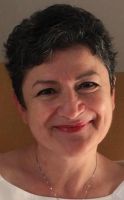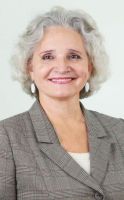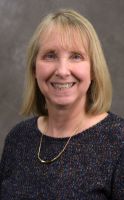 |
Prof. Serap Kurbanoglu (Turkey)
Serap Kurbanoglu received her PhD in Information Studies from Sheffield University, UK. She is a professor at the Department of Information Management of Hacettepe University. One of her main research areas is information literacy. She has numerous publications and is involved in numerous national and international projects and initiatives regarding information literacy. She is the former chair of EUCLID (The European Association for Library and Information Education and Research). She has good experience in organising professional conferences both on a national and international scale. She is the co-initiator and co-chair of ECIL (European Conference on Information Literacy). She is a member of the program committees of numerous conferences and also serves as a referee for scientific journals.
Title: Information Literacy in a Post-Truth Era
Abstract: The term "post-truth" - defined as circumstances in which facts and evidence are less influential in shaping public opinion than emotions and personal beliefs - has become increasingly prevalent in public discourse since it was announced as "Word of the Year 2016" by the Oxford Dictionaries. As we enter the post-truth era, facts have largely been replaced by emotions, and "fake news" has become the news that attacks one's beliefs. Fake news (disinformation, misinformation), urban myths, and conspiracy theories have always existed; however proliferation of ambiguous information today is at an alarming rate. The post-truth age is marked not only by an increasing amount of ambiguous information and information overload but also by increased polarisation, a fractionated media landscape, heuristic thinking, and algorithmic bias. There is evidence that, information behaviour of individuals of this age is influenced by confirmation bias, filter bubbles/echo chambers, repetition theory, information avoidance, and satisficing.
As a result, the ability and inclination to think critically about information (as well as news) is valued more than ever. Critical thinking demands that individuals develop and maintain a sceptical way of knowing and cultivate the ability to discern evidence-based and unbiased information to make sound judgments. In the post-truth age, critical thinking skills - an important component of information literacy- seem to be the first line of defence. Information literacy skills, along with critical thinking, can help in evaluating the credibility of sources, recognising trustworthy sources, and disclosing affiliations and conflicts. Source evaluation is, on the other hand, only one facet of being a literate consumer of information. In today's increasingly complex information landscape, proliferation as well as speed of dissemination of ambiguous information and the blurred line between producers and consumers of information require an extended approach to an information literacy skills set. Attempts should be made to adapt information literacy instruction according to the requirements of the post-truth age. Information literacy instruction must address issues not only about finding and evaluating the credibility of information/sources, but also about sifting fact from falsehood, setting aside one's preconceived notions (avoiding confirmation bias), recognizing weak arguments and common traps in arguments, understanding of search-engine rankings and of how algorithms cull and conceal content (i.e. personalized algorithms of social media), and developing fact-checking abilities.
There is no doubt that the post-truth phenomenon is far too complex, and there is no single remedy to attenuate the problems related to it. Although it might not suffice to solve the entire problem by itself, offering "extended information literacy" instruction programs, which include critical thinking, digital literacy, media literacy, and news literacy as the prominent components, is valuable. There are no quick fixes and a long time horizon. Thus, information professionals should start redoubling their efforts to equip individuals in the post-truth era with extended information literacy skills.
|
 |
Prof. Irina Zhilavskaya (Russia)
Irina Zhilavskaya is the Head of the Chair of Media Education Moscow Pedagogical State University, Head of the UNESCO Chair on Media and Informational Literacy and Media Education of Citizens, President of the Association of Media Education Specialists, member of the IFAP National Committee in Russia, member of the Board of the National Association of Mass Media Researchers, Certified Expert of the Federal Roster of Experts in the Scientific and Technological Sphere, Chief Editor of the International electronic magazine Media. Information. Communication, Academic Director of Media Education in the Librarian Sphere and Media Education in Cross-Ethnic Relationship master's programmes. She is also an author of more than 150 books and articles on media, mass media, people's media behaviour, media education and media and information literacy.
Title: Future of Media and Information Literacy: Russian perspective
Abstract: Media education and media and informational literacy (MIL) issues become critically topical in the age of digitalisation of our lives.
From the Russian viewpoint, media education development lies in an ecological approach to problem solving. In the context of the fourth industrial revolution, two paradigms collide in social consciousness. The first, technocratic, associates prosperity and development with digital infrastructure and cutting-edge technologies, including big data, neurotechnologies, artificial intelligence, Internet, robotics components, wireless communication and virtual and augmented reality technologies. The list can be expanded with new emerging and developing technologies. The second paradigm is defensive, fighting digital technologies, deliberately or not, resisting the dictatorship of algorithms and robotics and advocating for the human right to stay homo sapiens with emotions and feelings in our personality organisation.
We believe that the third paradigm exists and lies between those two. It is the media ecological approach. According to this approach, global development tends to digitalise all types of processes and relations - cultural, economic, and social. At the same time, it is very important to consider that only by adopting conscious media behaviour, mankind can keep its right to exist and not become a stage of civilisation development leading to artificial intelligence. MIL can answer various current questions: how to live between real and virtual worlds using the best achievements and minimising negative consequences, how to learn using different media, analyse current events, summarise and make decisions, and how to collaborate with other people on a high level of understanding and empathy.
|
 |
Prof. Trudi E. Jacobson (USA)
Trudi Jacobson, MLS, MA, is the Head of the Information Literacy Department at the University at Albany and holds the rank of Distinguished Librarian. She has been deeply involved with information literacy throughout her career and co-chaired the Association of College & Research Libraries Task Force that created the Framework for Information Literacy for Higher Education. She thrives on finding new and engaging ways to teach students, both within courses and through less formal means. With Tom Mackey, she originated the metaliteracy framework to emphasise the metacognitive learner as producer and participant in dynamic information environments. She is the co-author or co-editor of 14 books, including three books about metaliteracy and one on digital badging, and numerous scholarly articles.
Title: Creating Shareable Knowledge: Exploring the Synergy between Metaliteracy and Open Pedagogy
Abstract: Open educational resources (OERs) have created conditions for a transformational change in teaching and learning. New models and frameworks provide the basis for innovative, learner-centred pedagogical practices. Open pedagogy, which builds upon the use of OERs and open educational practices, envisages learners as knowledge creators. Metaliteracy proposes several active, reflective learner roles, with a particular emphasis on online, participatory environments. Learners who find themselves in open pedagogical situations may feel anxiety and uncertainty concerning the unaccustomed environment and expectations placed upon them. Metaliteracy provides a comprehensive scaffolding and flexible framework for the learning required in such settings, a development that extends life-long and life-wide. This presentation will explore the synergistic relationship between metaliteracy and open pedagogy that enhances learner engagement and empowerment. Several examples will be explored, including a course in which students edited and created Wikipedia articles within a metaliteracy framework.
|
 |
Prof. Thomas P. Mackey (USA)
Thomas P. Mackey, Ph.D., is Professor of Arts and Media at the State University of New York, Empire State College. His research examines metaliteracy, a concept he originated with Trudi Jacobson as an empowering pedagogical framework that advances dynamic and participatory learning. Dr. Mackey authored the framing chapter “Empowering Metaliterate Learners for the Post-Truth World” for their third metaliteracy book entitled Metaliterate Learning for the Post-Truth World. He developed an Open edX MOOC about the post-truth society with the Metaliteracy Learning Collaborative, a team of educators at the State University of New York. Dr. Mackey is a member of the editorial team for Open Praxis, the open-access peer-reviewed academic journal about open, distance and flexible education that is published by the International Council for Open and Distance Education (ICDE).
Title: Building Communities of Trust: Metaliterate Learning for a Post-Truth Society
Abstract: Metaliteracy is a reframing of information literacy to develop metaliterate learners as active producers of information in both local and global communities of trust. In today's post-truth society, personal and political beliefs have diminished the meaning and impact of verifiable facts and truthful reasoning. Metaliterate learners are empowered through reflective practice to responsibly consume and creatively produce information in collaborative and participatory social spaces. Through informed civic engagement, individuals take control of their participation while working cooperatively with others to build responsible communities of trust. Visualisations have the power to enhance our understanding of and connections with the metaliteracy framework, and several will be shared. An analysis of the Open edX Massive Open Online Course (MOOC), Empowering Yourself in a Post-Truth World, will show how metaliteracy is applied as a pedagogical model to the challenges of a post-truth society.
|